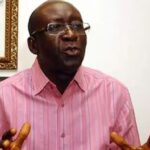
EFCC operatives had stormed Bello’s home on Benghazi Street, Wuse Zone 4, Abuja, at about 9:30 am on Wednesday.
However, our correspondent keenly observed how EFCC operatives were prevented by some policemen and other armed men guarding the ex-governor, from entering the house.
Earlier, the Governor of Kogi State, Usman Ododo, visited the embattled former governor amidst a heavy security crackdown on the latter’s Abuja home.
Ododo arrived at Bello’s residence at about 2:30 pm Wednesday, alongside several security operatives and youth supporters protesting against the siege to the former governor’s home.
Our correspondent who visited the residence on Wednesday afternoon observed the heavy presence of armed operatives of EFCC, policemen, operatives of the Department of State Security, Counter Terrorism Unit, and Yahaya Bello’s private security team.
Photographs seen by our correspondent on Wednesday show some armed EFCC personnel laying siege to the ex-governor’s home on Benghazi Street, Wuse Zone 4, Abuja.
As of press time, our correspondent could not independently confirm the reason behind the siege on Bello’s home as the spokesperson for the EFCC, Dele Oyewale, did not respond to inquiries concerning the development.
However, the EFCC had earlier dragged Yahaya Bello, his nephew Ali, one Dauda Sulaiman, and Abdulsalam Hudu before Justice James Omotosho of the Federal High Court, Abuja, in an amended charge in March 2024 over an alleged N84bn money laundering.
Reacting to the development, the ex-governor’s media office, in a statement, condemned the operatives’ actions while urging President Bola Tinubu to caution the EFCC.
According to the statement, the presence of the operatives in Bello’s residence negated the order of injunction granted on February 9, 2024, by the High Court of Justice, Lokoja Division, in Suit No. HCL/68M/2024 between Yahaya Bello v. EFCC, restraining the commission either by itself or its agents from harassing, arresting, detaining, or prosecuting him, pending the hearing and determination of the substantive fundamental rights enforcement action.
The statement read, “The EFCC was duly served with that order on February 12, 2024, and on February 26, 2024, the EFCC filed an appeal (Appeal No.: CA/ABJ/CV/175/2024: Economic and Financial Crimes Commission v. Alhaji Yahaya Bello) against the said order to the Court of Appeal Abuja Division. The appeal was accompanied by a Motion for a Stay of Execution of the order of the High Court, which the Court of Appeal adjourned for hearing till April 22, 2024.
“Furthermore, judgment in the substantive case between Alhaji Yahaya Bello and the EFCC will be delivered at 12 noon today in Lokoja.
“Contrary to all of the above, the EFCC has now laid siege to the home of H.E Yahaya Bello, seeking to arrest him in contravention of the extant orders!
“It is a surprise that an agency led by a lawyer could flagrantly disobey a subsisting court order by taking actions contrary to the reliefs granted.
“We are aware of the total commitment of President Bola Tinubu’s current administration to the rule of law and can say categorically that the EFCC leadership might have offered the agency on a platter of gold to desperate politicians to convert it to their score-settling tool without minding the effect on its integrity and the image of Nigeria as regards the rule of law.”
The ex-governor’s media office further alleged that the anti-graft agency was plotting to embarrass and harass him through spurious allegations, especially the latest one dating back to September 2015, long before he assumed office.
The anti-graft agency, in the 17-count amended charge, accused Yahaya Bello of money laundering, breach of trust, and misappropriation of funds to the tune of N84,062,406,089.88.
The EFCC had claimed in the amended charge that the former governor was at large.
Before the charge, the EFCC had arraigned Bello’s nephew, Ali Bello, before the Federal High Court sitting in Abuja for alleged money laundering involving N10bnn belonging to the Kogi State Government.
However, the state government faulted the charge, describing it as “ridiculous” and “laughable,” adding that it was impossible, as the former governor was not yet able to access or misappropriate state funds at the said time.
The state government, in a statement signed by the Commissioner for Information and Communications, Kingsley Fanwo, had on February 7, 2024, accused the EFCC of being “infested with persons whose intents disagree with the noble intention of ‘Mr. President to defeat corruption in Nigeria.”





